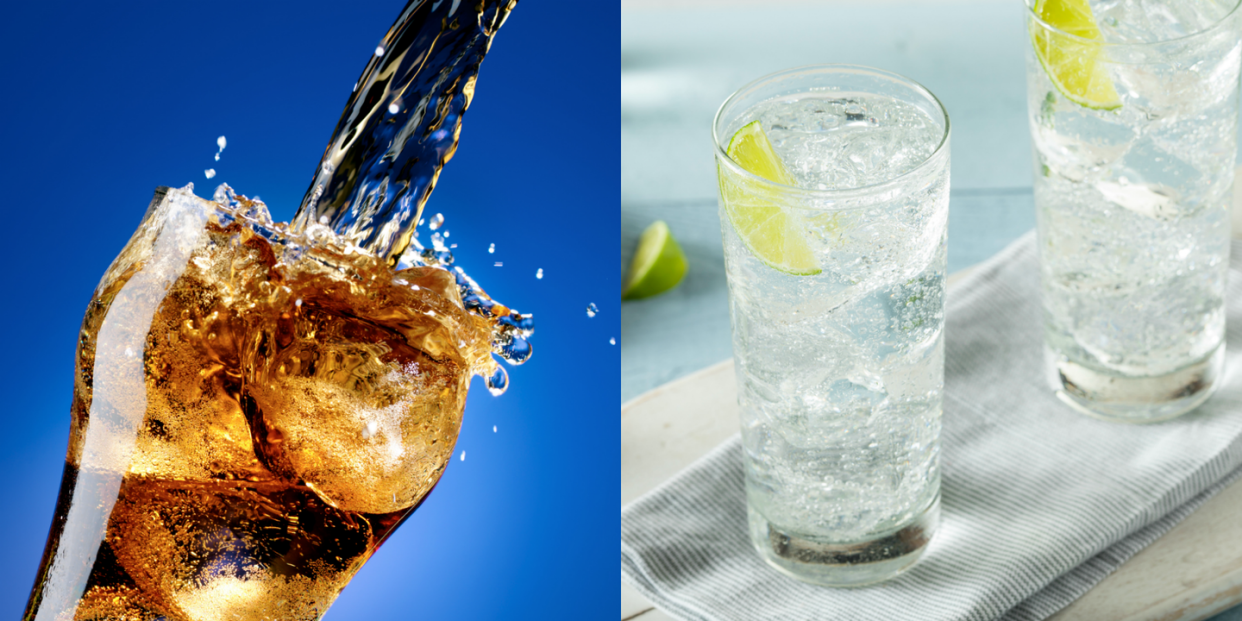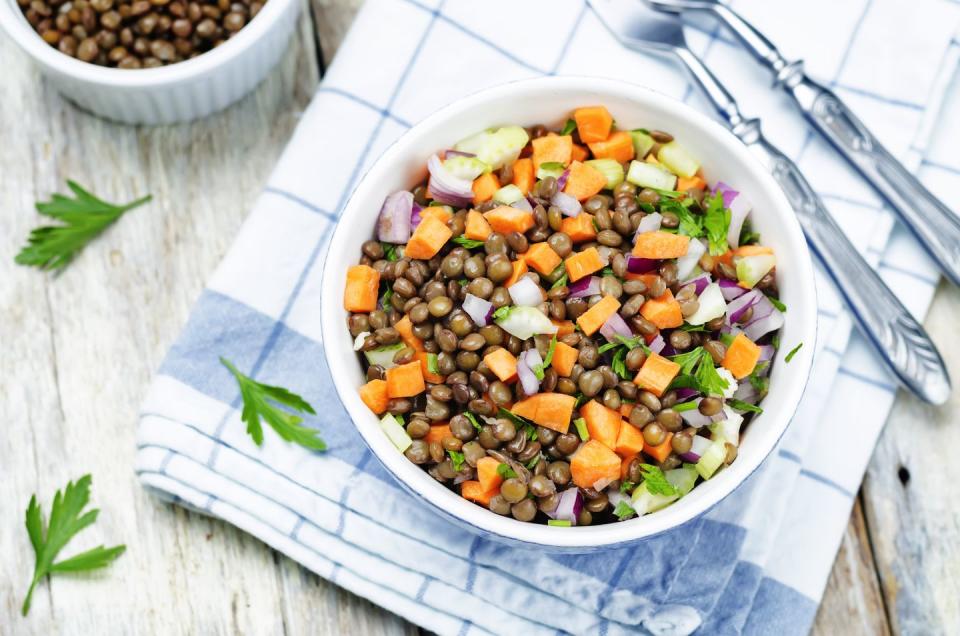16 Surprising Ways to Lose Weight Without Exercise, According to Experts

"Hearst Magazines and Yahoo may earn commission or revenue on some items through the links below."
It’s a perennial question: Can you lose weight without exercise? Let’s start with this: Exercise is terrific for your body and mind, in so many ways. It cuts down on your risk for a multitude of diseases and can lower your incidence of depression, anxiety, and other mental health problems, as well as boost your energy, help you sleep, and more. It can also help you get and keep muscle. So exercise = health, and we should all move our bodies every day.
That said, when it comes to losing weight, what you eat is key—and studies show there are plenty of weight loss strategies that have nothing to do with exercise (though the two certainly go hand in hand and are best served together). Also, consider this, per Jessica Cording, R.D., author of The Little Book of Game Changers: “You can accidentally get exercise into your day but you can’t accidentally eat well—you have to be intentional about it.” Basically, putting a little thought into what you eat can go a long way toward helping you reach your health goals.
Check out these 16 science-backed tips to lose weight.
1. Review your portions.
When you’re at home, eat from smaller plates and bowls. You’ll likely take in fewer calories, and it tricks your brain into thinking you’re chowing down on more than you actually are. A good rule of thumb for a balanced meal: a clenched fist is a good portion size for a dense carb (1 cup), and your palm measures to about 4 oz, a good portion size for lean meat or protein—then add about 2 tbsp healthy fat (ideally from whole foods like nuts or avocado), plus plenty of green or colorful veggies to fill the rest of your plate.
When eating out, portion control can be a tougher challenge, given the giant serving sizes in restaurants, so before you go, think about how you’re going to handle that. You can order an appetizer and small salad instead of an appetizer and main dish; you can split a dish with a friend; or you can ask for a to-go box right up front, and put half your meal in there before you dig in. Have a plan and intention ahead of time and you’re more likely to stick to it.
2. Eat more fiber.
“Fiber helps with weight loss in so many ways,” says Karen Ansel, M.S., R.D.N., author of Healing Superfoods for Anti-Aging: Stay Younger, Live Longer. “For starters, it expands in your gut like a sponge so it’s a natural appetite suppressant. Plus, the latest research is finding it has beneficial impacts on good gut bacteria that help produce hormones in the gut that tell your brain you’ve had enough to eat. Aim for at least 25 grams a day from a variety of foods like whole grains, beans, fruits, and vegetables.”

3. Load up on protein too.
“Like fiber, protein naturally helps you feel full by influencing the production of satiety hormones,” says Ansel. “It takes a long time to digest, so you’re unlikely to go scrounging for a snack after a protein-rich meal. And here’s a neat trick: Protein also takes more energy to digest than, say, fat or carbs, so you don’t store as many of its calories. For maximum impact aim for 20 grams per meal from lean proteins such as fish, chicken, turkey, eggs, and low fat dairy.”
4. Have plenty of fat.
“It’s 2023, but I still come across lots of people who are scared of fat,” Cording says. Fat helps you feel fuller, longer, and can help prevent blood sugar crashes that will leave you feeling hangry, she points out. Cording suggests adding healthy fats to your diet, like olive oil, avocado, nuts, seeds, and oily fish. “When you start to be more intentional about your fat intake, it can really help,” she says. According to the Dietary Guidelines for Americans, fats should make up 20-35% of your total daily calorie intake.
5. Balance out your carbs.
Carbs aren’t the devil, but Cording says it’s important to balance them out with protein and fat to help you feel fuller, longer (and therefore less likely to snack mindlessly). That includes doing things like having eggs or avocado with whole grain toast and natural peanut butter on crackers. Worth noting: The Dietary Guidelines for Americans recommend that carbohydrates make up 45% to 65% of total daily calories.
6. Get enough sleep.
It’s well-established that sleep deprivation can lead to weight gain. It comes down to hormones: Sleep deprived people produce more ghrelin, an appetite-stimulating hormone. And they produce less leptin, the hormone that tells you when you’ve eaten enough. There’s also evidence that the overly-sleepy eat more calories, and more comfort-food-carbs. And it’s no surprise that when you’re exhausted, it’s harder to control your impulses (meaning, grabbing cookie after cookie may seem like a fine idea).
7. Hydrate, hydrate, hydrate.
Sometimes when you think you’re hungry, you’re actually thirsty—maybe even slightly dehydrated. So in between meals, before you nosh on a snack try drinking a big glass of water. It’s also a good idea to do that before a meal: It leads to greater weight loss, one study showed. And carry a bottle with you throughout the day, to sip as you go.
8. Cut down on sugar.
“It’s unclear whether sugar in and of itself makes you gain weight,” says Ansel. “But one thing is for sure—it tends to travel in foods that have way too many calories. Whether it’s soda, sweetened lattes, or dessert, these should be the first foods to go if you’re trying to slim down.” And remember, the sweet stuff is hidden in all sorts of foods—ketchup, bread, salad dressing, and so on.
9. Don’t drink your calories.
It’s a simple way to take in less calories overall. But there’s another important reason to follow this rule: Drinking calories, rather than eating them, is less satisfying and doesn’t lead to the same feeling of fullness, research shows. So that’s another reason why drinking your calories—especially sugary bevs—can lead to weight gain.
10. Eat more mindfully.
In other words, slow down. Your brain needs to catch up with your mouth and send the signal that you’re full, and that’s harder when you’re speeding through your meal. Also, studies have shown that when you’re distracted, you tend to eat more. So stash your phone, turn off the TV, and pay attention to what you’re eating.
11. Stash food out of sight.
One study found that people with obesity are more likely to keep food around in “highly visible locations.” So do the opposite, especially with stuff that you don’t want to be munching all the time. Meaning, that bowl of apples? Fine to keep it in your eye line.
12. Cut out diet sodas.
A recent study found that kids and teens who drink diet beverages eat more calories during the day. This is just one of several studies connecting diet drinks to weight gain. So again—water is a great bet! Want to make it more interesting? Get a water bottle infuser, an easy way to add fruit.

13. Breathe.
When you’re stressed, your levels of the hormone cortisol spike (it’s that fight-or-flight response). And some older studies have shown that people tend to eat more if they’re “high cortisol reactors” (you know, those people who particularly tend to lose their chill under stress). So to avoid that nom-nom-nom reaction (and to protect your health in so many other ways), take time each day to do something to lower the stress temperature, whether it’s meditation, exercise, or sitting quietly with a good book.
14. Write things down.
“It may not be sexy, but study after study has shown that writing down what you eat is one of the most effective weight loss tools out there,” says Ansel. “Whether it’s in a journal, using the notes app on your phone, or your favorite weight loss app, recording what you eat is the single best way to identify those sneaky little ways you might be overdoing it.”
15. Don’t sweat “off” days.
Keri Gans, R.D., author of The Small Change Diet, says she’ll often see people who have an “all or nothing” attitude about eating healthy. “Instead of letting one day of ‘poor’ eating go and returning to their plan, they simply give up on it all together,” she says. Her advice: Focus on the overall healthy eating goal and don’t stress the small stuff.
16. Create an eating plan for the long haul.
Gans stresses the importance of looking at weight loss as a way to eat more healthfully, now and in the future. That’s why she recommends viewing your eating plan as a change in lifestyle that you’ll maintain, vs. something you’ll go on and off. She also suggests incorporating foods you love into your eating plan to make sure you don’t feel deprived. Her advice: “Learn how to incorporate them into your plan in a healthier way.”
You Might Also Like

